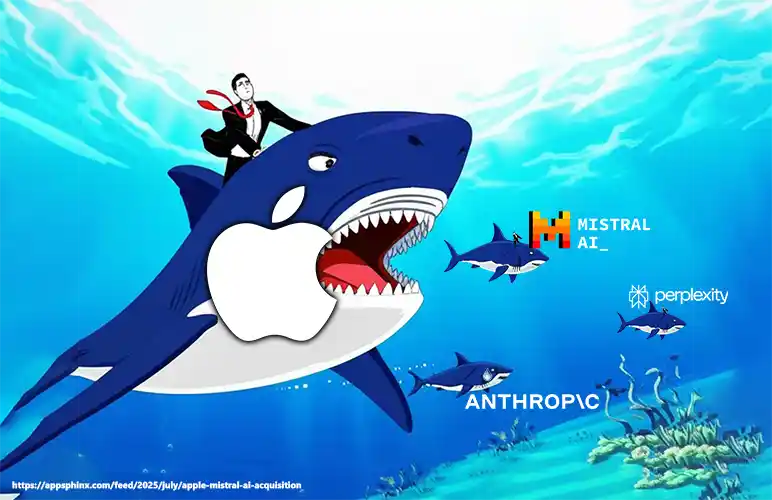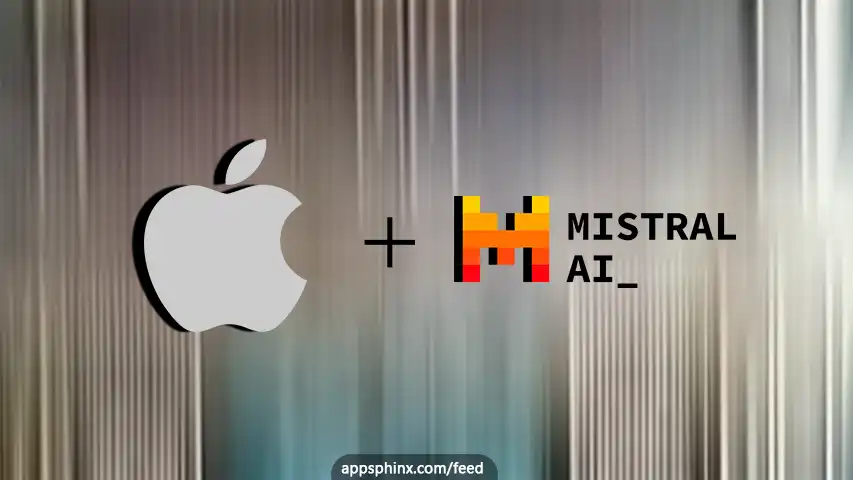APPLE, MISTRAL, AND THE AI RACE: IS THIS EUROPE’S DEEPMIND MOMENT?
On July 13, 2025, Bloomberg broke the news: Apple is in talks to acquire Mistral, the French AI company making waves with its large language models. The goal? To finally give Siri a brain transplant and catch up in the AI race. But is this just another case of Big Tech buying its way to the top? And what does it mean for Europe’s place in the new AI world order?
BIG TECH’S FAVORITE SHORTCUT: BUY, DON’T BUILD
This isn’t the first time we’ve seen a tech giant snap up an AI innovator to leapfrog the competition. Big Tech often skips the long, hard road of R&D by buying startups instead. Remember when Google bought DeepMind? That deal supercharged Google’s AI efforts and paved the way for projects from AlphaGo to Gemini.
For those unaware, DeepMind is the AI company founded by Demis Hassabis, which Google acquired in 2014. Hassabis and his team have since made ground-breaking advances in AI research, even won Nobel price.
Apple didn’t even develop Siri from scratch. If you’re old enough to remember, Siri was also supposed to be released for Android—until Apple acquired the company behind it before its launch. Similarly, Google bought Android from Andy Rubin to get ahead in the mobile OS race. There are countless examples that show the same playbook: if you can’t build it fast enough, buy someone who already has.
Apple has tried for years to build AI in-house, but let’s be honest—Siri has lagged behind Alexa, Google Assistant, and now ChatGPT. Buying Mistral could be Apple’s best shot at catching up, especially as LLMs become the new battleground for tech dominance.
THE PROBLEM OF AI BIAS: CAN APPLE DO BETTER?
But there’s a catch. Whoever builds the LLM, their biases—intentional or not—get baked in. I had Prof. Chris Kulp, a scientist and AI/ML researcher from Lycoming College, USA, on my podcast (listen here). He explained this through a simple but meaningful analogy.
He said that just like how eating healthy food helps keep your body in good shape, feeding quality data into an AI system makes it more trustworthy. But then he added something important: no matter how careful we are, there’s no such thing as truly bias-free data. Every dataset carries with it the assumptions, judgments, and blind spots of the people who built it.
We also talked about how parenting and AI training aren’t all that different. As he put it, when you raise a child, you model the behaviour you want them to follow. With AI, you're doing the same thing—you're feeding it examples, and you're hoping it generalizes the right way. But if those examples are skewed, limited, or biased, so will the output be.
This made me think of something said by one of my favourite writer, Yuval Noah Harari, the author of Sapiens. He once asked:
“How can we trust an AI made by humans, when we can’t even trust another human?”
That line hits hard. If we’re moving toward a world shaped by ASI or any super intelligent systems, the real challenge isn’t just the code or the compute—it’s the training data. Whether that data is real or synthetic, it reflects human perspectives, cultures, and priorities.
It’s a reminder that all technology reflects its creators—for better or worse.
And that’s the paradox: every LLM reflects the data and worldview of its creators. We’ve seen Chinese models with their own slant, and Western models with theirs. For example, when the Chinese AI model DeepSeek-V2 launched, it impressed the industry with its technical capabilities, but it also showed clear signs of subtle state influence. There were cases where, if you asked about disputed territories, the model would echo the Chinese government’s position, even if it contradicted international consensus or facts. This isn’t unique to China—every country’s models can have their own built-in perspectives.
So, being a tech company, Apple wants control. As AI becomes commoditized, if you can’t produce your own, you risk inheriting someone else’s biases. Apple doesn’t want Siri to be shaped by a third-party model that could say things Apple can’t stand behind. That’s why it makes sense for Apple to build or buy its own LLM, rather than relying entirely on OpenAI or another provider. There have also been reports that Apple is interested in Perplexity AI, founded by Aravind Srinivas, which has made headlines as one of the first major AI search engines and pushed Google to introduce AI features in its own search.
No matter how hard Apple tries, some bias will always creep in. The best we can do is demand transparency and diverse data.

EUROPE’S AI BRAIN DRAIN: A NEW CHAPTER?
If Apple does buy Mistral, it’s a bittersweet moment for Europe. The continent that once led the Industrial Revolution has already lost the tech revolution and now risks falling behind in the AI revolution as well. There’s a drought of European tech giants, and every time a homegrown success gets snapped up by Silicon Valley, the gap widens. Will EU regulators allow it? Or will they step in to keep Europe in the AI race?
FINAL THOUGHTS: CONTROL, INNOVATION, AND THE FUTURE
Apple loves control—over its chips, its modems, its ecosystem. Buying Mistral fits that playbook. But the real question is: will EU regulators allow this? And if they do, is Mistral enough to help Apple finally build an AI that’s smart, trustworthy, and truly global—able to compete with giants like Google, OpenAI, and Anthropic? Or will it just be another chapter in the story of Big Tech consolidation?
We are at the most significant moment in human history: the AI war. Unlike previous battles—such as hardware vs. software (IBM vs. Microsoft), the OS wars (Windows vs. Mac), and the e-commerce race (Amazon vs. eBay)—none can match the profound impact of the AI war. We are witnessing the dawn of a new era, and it’s important to recognize that AI is still in its nascent state. Apple’s strategic moves could not only reshape Siri but also redefine the future of technology. As the largest consumer brand on the planet, Apple commands an extensive fleet of consumer hardware and maintains total control over its software and hardware ecosystems. This strategic advantage allows Apple to influence the direction of technology in ways we have yet to imagine.

